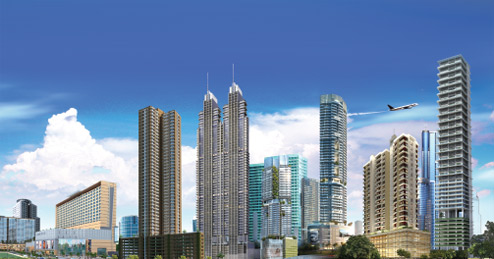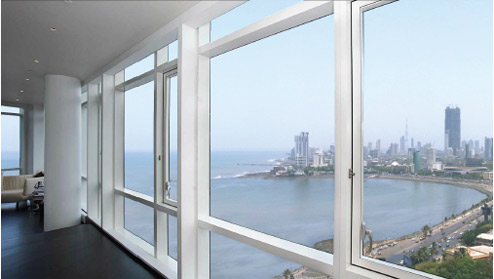
HBS Group's Worli project demonstrates how redevelopment is the way forward to handle Mumbai's space crunch and a win-win situation for developers and retailers to meet their aim of catalysing urban renewal and improving Mumbai's competitiveness.
In a landmark achievement, the proposed policy under Development
Control Rules 33(9) will give cluster redevelopment in Mumbai a big
boost. It is a win-win model for developers and tenants as the new
rules offer more benefits to developers as well as members, resulting in
larger flats for individual owners. With the city having close to 16,000
dilapidated buildings, the new scheme on cluster redevelopment will
generate close to 2.5 lakh housing units, as per
a study.
The Development Control Regulation (DCR) provision 33 also offers
a new ray of hope. For redevelopment projects, the Government
has agreed to offer extra Floor Space Index (FSI) of 0.5. With this,
redevelopment projects will gain an FSI of 2.5 (3 for MHADA-cessed
buildings) or an FSI needed to accommodate all the tenants of the
building.
WAY AHEAD
Before Mumbai can call itself a world-class city, it is imperative to ensure
housing becomes more available and affordable. There is also an urgent
need for the city's ageing real estate stock to be upgraded into modern
dwellings. With sky-rocketing real estate prices, scarce land availability
and limited expansion possibilities, redevelopment appears to be the
way forward. Planned redevelopment holds the key to increasing space
and bettering living standards, particularly in South Mumbai – India's
most expensive real estate destination. But sadly, most redevelopment
projects in the city are entangled in differing issues – be it tenants
demanding greater living spaces in the reconstructed property, delay
in grant of possessions or delay in approvals by urban local bodies.
Regulatory bottlenecks also act as serious dampeners.

ENDEARING BUSINESS MODEL
Redevelopment is a key driver and opportunity to deliver future growth
in Mumbai. Besides solving the city's space problems, redevelopment is
an enabler for community participation and helps the tenants redefine
their lifestyles. Redevelopment creates efficient spaces which improve
the property's economic value.
The business model of redevelopment of old property sets the ball
rolling for urban regeneration by improving upon the city's real estate
quality. Renewal of the existing property improves the competitiveness
of the city's prime precincts by creating high-quality, modern and
earthquake-resistant buildings, supported by wide roads and properly
sized infrastructure, with ample open green areas. Further, without the
need for buying fresh land, it enables real estate developers to sell the
extra FSI area at the current market price, thus earning a higher margin.
Hence, redevelopment essentially
means extra saleable area that can fetch the developer a higher
market price.

THE HBS EXAMPLE
A shining example of a large-scale redevelopment project in Mumbai is
HBS Group's Shiv Shahi Co-operative Housing Society project at Worli.
The 60-year old Shiv Shahi complex was a cluster of 12 dilapidated
residential buildings with 16 apartments each. The New Shiv Shahi
society is a unified vision of redevelopment by its members. By way
of redevelopment, its 192 members and 1,000 residents shall be
rehabilitated in three wings of 42 storeys each.
A key feature of the redevelopment project of Shiv Shahi has been the
real estate developer's ethos to provide superior lifestyle to its members.
Redevelopment was undertaken with the single aim of rehabilitation
and complete transformation of members and their existing lifestyles.
The building will house only the existing tenants, granting them an
opportunity to upgrade their lifestyles by enhancing prestige and
ownership value of each home.
| DESIGN PHILOSOPHY | |
| The project takes on a modern character and complements the skyline of
a futuristic city through premium quality, comfortable and modern homes.
There was a keen urge to improve their lives through state-of-the-art
amenities, lavish green spaces and modern technologies. The habitable
space of members has been improved by way of a swimming pool, multipurpose
hall, wide-spread green gardens and racquet-sports courts. The
apartments have been planned with space efficiency and flexibility of a
third bedroom, while the niche in the dining area has the capability to
accommodate a study or pooja area. The design philosophy creates self-supporting neighbourhood and features advanced waste management, water recycling and renewable energy generation systems. Designed by reputed consultants and foreign architects, the project is already winning accolades. It bagged the International Asia Pacific Award for the Best Redevelopment Project in Asia-Pacific region. The 'LEED Silver' rating also adds value to inhabitants' quality of life. |
|
 |
|
| REGULATORY APPROVALS | |
| The Shiv Shahi project has been a classic example of pro-active and positive clearances provided by the government authorities including MHADA, MCGM, UD Department, MCZMA and MOEF. Redevelopment of this complex is a bonafide testimony of redevelopment of a large society not just being a dream, but a dream come true. With collective and professional approach, motivated and unified spirit, patience and sensitivity of a pragmatic developer and members, a redevelopment project can achieve a new benchmark of modern and contemporary redevelopment. | |
| INDUSTRY THUMBS-UP | |
| With urban redevelopment in South Mumbai being the next mega opportunity, HBS Realtors is keen to play a meaningful role in the endeavour. It is already fast gaining reputation as a specialist in regeneration housing solutions and has undertaken several projects towards this aim. Its focus continues to be to preserve and enhance the cultural and historical community assets and ensure the cultural fabric of the community is not compromised. | |
 |
|
| Without an iota of doubt, redevelopment is the key to overcome Mumbai's space crunch and improve its infrastructure. It works as an economic engine unlocking land parcels for development and improves the city's economic competitiveness. Redevelopment of dilapidated properties leads to tangible economic benefits by creating better quality housing and boosting the property's value. To push the redevelopment bandwagon, taking a second look at realty reforms and allowing foreign direct investment in the real estate sector are the need of the hour. | |
- IR Connect Editorial Team |
|
 |
|